| Srl | Item |
| 1 |
ID:
157898
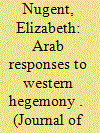

|
|
|
|
|
| Summary/Abstract |
Scholars have long held that Islamism—defined as a political ideology that demands the application of Islamic holy law and the deepening of religious identity—is in part a response to Western domination of Muslim lands. Drawing on the literatures on nationalism and international relations theory, we argue that Islamism is one of a menu of options that Muslims may adopt in response to Western hegemony—a menu that includes Arab nationalism and pro-Western accommodation. We hypothesize that a Muslim’s ideological response to Western domination is a function of the type of domination experienced—that is, military, cultural, or economic—as well as of individual-level characteristics such as intensity of religious practice. We test this hypothesis with a nationally representative survey experiment conducted in Egypt. We find that, among subjects in our study, pro-Western responses to Western domination were more common than “Islamist” or “nationalist” ones and that these were particularly driven by reminders of the West’s economic ascendancy. These findings suggest that foreign domination does not always yield defensive responses and often produces desires for greater cooperation with the hegemon.
|
|
|
|
|
|
|
|
|
|
|
|
|
|
|
|
| 2 |
ID:
143614
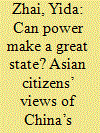

|
|
|
|
|
| Summary/Abstract |
With its rapid economic growth, China has become the second largest economy. At the same time, a rapid increase in its defense expenditure and expanding maritime ambitions have raised concerns among other Asian nations. Moreover, by displaying its economic and military might China’s recent assertive actions in the East China Sea and South China Sea seem to “prove” longstanding worries regarding China’s threats. This article reviews the traditional Chinese philosophy of the great state and argues that China unfortunately deviates from it. Cross-national survey data show that Asian citizens widely acknowledge the rising power of China. Nevertheless, an expansion of economic and military power fails to yield more positive evaluations. The country’s pursuit of power and blunt foreign policy push neighboring states to welcome an expansion of Japan’s military role and to intensify their security ties with the United States to achieve a balance of power. There needs to be a shift in China’s foreign policy to earn trust and respect from its Asian neighbors. Power can create a hegemon but it definitely will not make China a great state
|
|
|
|
|
|
|
|
|
|
|
|
|
|
|
|
| 3 |
ID:
108382
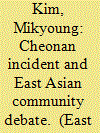

|
|
|
|
|
| Publication |
2011.
|
| Summary/Abstract |
The East Asian community debates project the region as one integral unit. Rapidly shifting landscapes explain the tension between the old order and emerging hierarchy where North Korea plays a crucial role. This paper analyzes North Korea's place in the East Asian community debates by examining the regional governments' reactions to the Cheonan incident. The responses and circumstances of South Korea, Japan and North Korea to the sunken ship incident demonstrate three dynamics. First, domestic political needs of the regional government supersede normative Community rhetoric. Second, manageability of the North Korean regime will determine the next regional hegemon. And third, the community debates need to include North Korea for viability.
|
|
|
|
|
|
|
|
|
|
|
|
|
|
|
|
| 4 |
ID:
077069
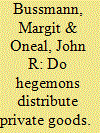

|
|
|
|
|
| Publication |
2007.
|
| Summary/Abstract |
According to power-transition theory, war is most likely when the leading state is challenged by a rapidly growing, dissatisfied rival. Challengers are said to be dissatisfied because the hegemon manages the status quo for its own benefit, rewarding its allies and penalizing rivals. We assess the leading state's ability to distribute the private goods of peace, victory in war, and economic prosperity. States with alliance portfolios similar to the hegemon's are not protected from aggression; nor do they grow more rapidly than countries with which the leading state is not closely allied. The dominant power's allies are more apt to win defensive wars, although the means by which this is accomplished are unclear. On balance, our results call into question the ability of the leading state to engineer satisfaction by distributing private goods. Like hegemonic-stability theory, power-transition theory exaggerates the influence of the leading state over the international system.
|
|
|
|
|
|
|
|
|
|
|
|
|
|
|
|
| 5 |
ID:
160060
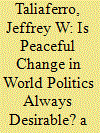

|
|
|
|
|
| Summary/Abstract |
An assumption runs through this symposium that peaceful change is desirable and ought to be encouraged. We do not believe it is that simple. The term “peaceful change” itself is not well defined. The article, therefore, narrowly defines peaceful change as a process whereby a hegemon voluntarily cedes its dominant geopolitical role to a challenger in one or more regions. Drawing on neoclassical realism, we hypothesize that a declining hegemon will only accept peaceful change if: (1) it has high confidence change is inevitable because it lacks the military, economic, or political means to resist it; or (2) when domestic political or economic costs of resistance of prohibitively high; or (3) when the leadership of the hegemonic state faces domestic constraints in its ability to enact policies to resist the challenger.
|
|
|
|
|
|
|
|
|
|
|
|
|
|
|
|
| 6 |
ID:
151205
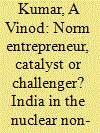

|
|
|
|
|
| Summary/Abstract |
The history of India’s interaction with the normative structures of the non-proliferation regime has been unique albeit tumultuous. The vibrancy of the roles and identities that India had attained in the normative churning of the regime is a useful case study to understand the dynamics of norm construction within the non-proliferation system. While the model of norm entrepreneurship can be used to explain this phenomenon, the Indian example shows that the spectrum of the term ‘agency’ can transcend the existing understanding of norm entrepreneurship. The article uses India’s non-proliferation history to examine how actors, based on their conceptions of interest and driven by various systemic factors, influence the norm construction process through different role identities.
|
|
|
|
|
|
|
|
|
|
|
|
|
|
|
|
| 7 |
ID:
164451
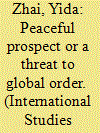

|
|
|
|
|
| Summary/Abstract |
This article investigates youth perceptions of China's rise in seven Asian societies. Unlike previous studies’ findings that most Asians hold positive views of China's influence, this study finds that Asian youth view a rising China more coolly than does the general public. Even though they acknowledge that China's rise offers increased opportunities, Asian youth tend to strongly distrust and worry about the negative influence of China. The results show that most youth in Asian countries surveyed believe China's rise will challenge global order and that China will not maintain peaceful relations with other Asian countries. Multilevel analyses show that both microlevel personal traits and macrolevel structural factors can account for how Asian youth view China's rise. The results indicate that China has not successfully convinced young Asian citizens of its determination to rise peacefully. China's foreign policymaking should take greater consideration of Asian public opinion rather than be dominated by wishful thinking.
|
|
|
|
|
|
|
|
|
|
|
|
|
|
|
|